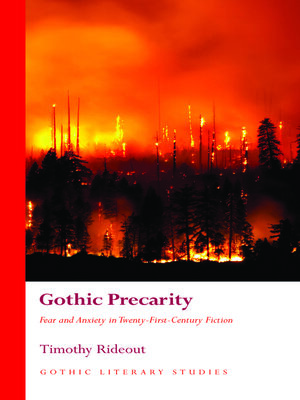Gothic Precarity
ebook ∣ Fear and Anxiety in Twenty-First-Century Fiction · Gothic Literary Studies
By Timothy Rideout

Sign up to save your library
With an OverDrive account, you can save your favorite libraries for at-a-glance information about availability. Find out more about OverDrive accounts.
Find this title in Libby, the library reading app by OverDrive.



Search for a digital library with this title
Title found at these libraries:
| Library Name | Distance |
|---|---|
| Loading... |
Ours is an age of precarity, as fear and anxiety have come to define the twenty-first century. Politically, economically and socially, the neoliberal orthodoxy has become globally dominant and, as a direct result, traditional frameworks of protection have been dismantled, while existential insecurity is increasingly passed from nations and institutions to individuals. In the meantime, the Gothic mode of fiction is experiencing a new ascendancy, strengthening the argument that the Gothic represents the best literary mode with which to decode this age of precarity. In this context, the present study offers a groundbreaking examination of the Gothic mode's conceptual affinity with notions of neoliberal precarity. Exploring twenty-first-century Gothic fiction's engagement with the most pressing issues of our age, it considers the oppression and existential entrapment experienced by marginalised populations in the provincial China of the late 1970s, and observes a modern-day Frankenstein's creature occasion violence and destruction across Baghdad post the 2003 Iraq War. The reader will also discover vampires (representatives of a voracious, toxic economic model) in an alternate Mexico City, encounter a nomadic group traversing the only remaining wilderness in a near-future North America devastated as a result of the climate crisis, and be haunted by a spectral migrant who died in their efforts to flee political oppression in Vietnam.







